Critical Analysis of Amazon's Business Practices
VerifiedAdded on 2020/03/23
|13
|3186
|58
AI Summary
This assignment critically examines Amazon's business practices through the lens of Positive Accounting Theory (PAT) and Corporate Social Responsibility (CSR). It argues that Amazon utilizes PAT to prioritize shareholder wealth maximization over other stakeholders' interests, potentially leading to negative social impacts. The analysis also critiques Amazon's CSR reporting as superficial and lacking real change in its operations and behavior.
Contribute Materials
Your contribution can guide someone’s learning journey. Share your
documents today.

ACCT20074 Final Assignment
Term 2, 2017
Student ID:………………………………. Student name……………………………………………………..
Marker’s overall comments: The markers may include any final
comments here.
Overall Mark (Total) out of 50: 0
Term 2, 2017
Student ID:………………………………. Student name……………………………………………………..
Marker’s overall comments: The markers may include any final
comments here.
Overall Mark (Total) out of 50: 0
Secure Best Marks with AI Grader
Need help grading? Try our AI Grader for instant feedback on your assignments.
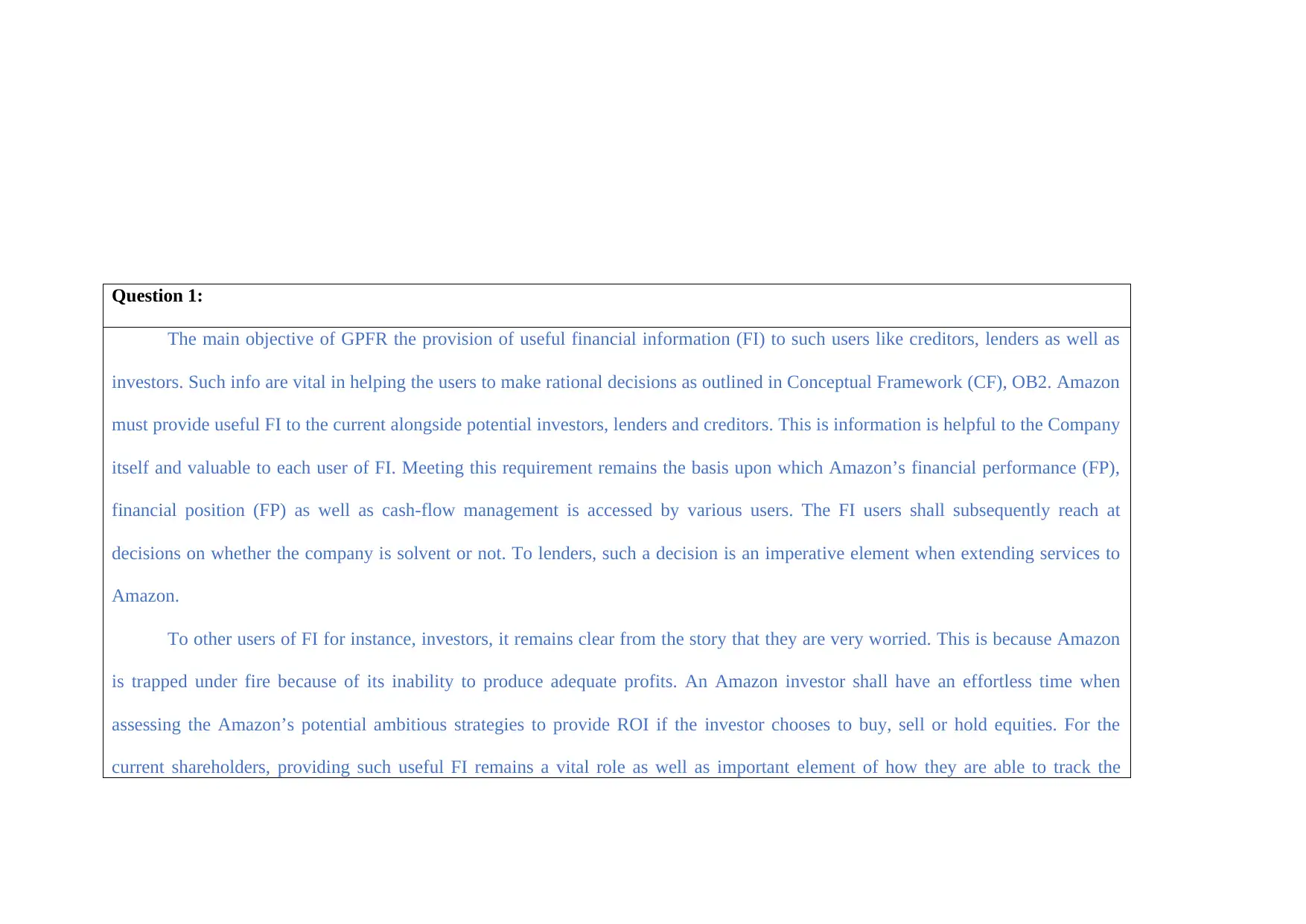
Question 1:
The main objective of GPFR the provision of useful financial information (FI) to such users like creditors, lenders as well as
investors. Such info are vital in helping the users to make rational decisions as outlined in Conceptual Framework (CF), OB2. Amazon
must provide useful FI to the current alongside potential investors, lenders and creditors. This is information is helpful to the Company
itself and valuable to each user of FI. Meeting this requirement remains the basis upon which Amazon’s financial performance (FP),
financial position (FP) as well as cash-flow management is accessed by various users. The FI users shall subsequently reach at
decisions on whether the company is solvent or not. To lenders, such a decision is an imperative element when extending services to
Amazon.
To other users of FI for instance, investors, it remains clear from the story that they are very worried. This is because Amazon
is trapped under fire because of its inability to produce adequate profits. An Amazon investor shall have an effortless time when
assessing the Amazon’s potential ambitious strategies to provide ROI if the investor chooses to buy, sell or hold equities. For the
current shareholders, providing such useful FI remains a vital role as well as important element of how they are able to track the
The main objective of GPFR the provision of useful financial information (FI) to such users like creditors, lenders as well as
investors. Such info are vital in helping the users to make rational decisions as outlined in Conceptual Framework (CF), OB2. Amazon
must provide useful FI to the current alongside potential investors, lenders and creditors. This is information is helpful to the Company
itself and valuable to each user of FI. Meeting this requirement remains the basis upon which Amazon’s financial performance (FP),
financial position (FP) as well as cash-flow management is accessed by various users. The FI users shall subsequently reach at
decisions on whether the company is solvent or not. To lenders, such a decision is an imperative element when extending services to
Amazon.
To other users of FI for instance, investors, it remains clear from the story that they are very worried. This is because Amazon
is trapped under fire because of its inability to produce adequate profits. An Amazon investor shall have an effortless time when
assessing the Amazon’s potential ambitious strategies to provide ROI if the investor chooses to buy, sell or hold equities. For the
current shareholders, providing such useful FI remains a vital role as well as important element of how they are able to track the
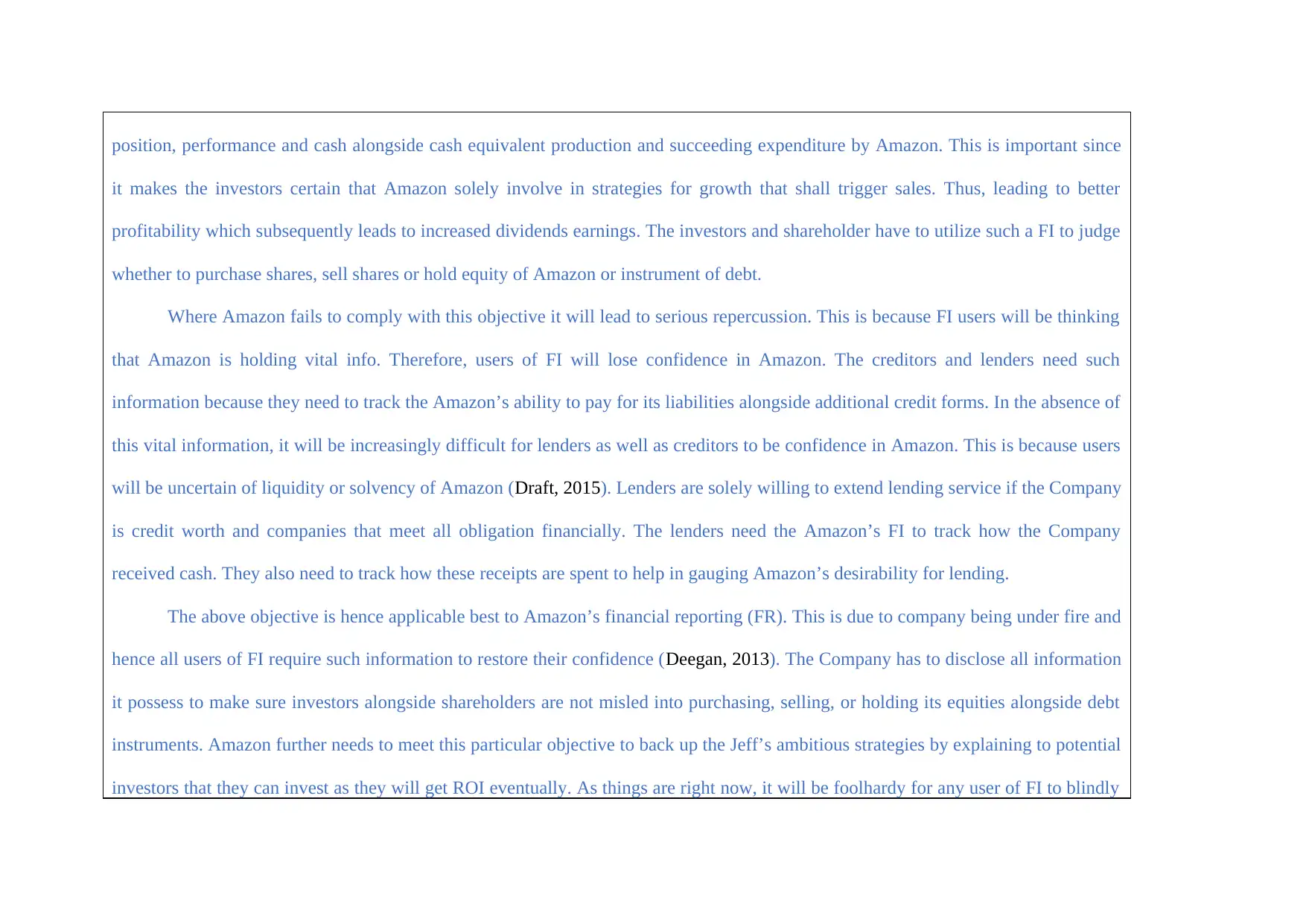
position, performance and cash alongside cash equivalent production and succeeding expenditure by Amazon. This is important since
it makes the investors certain that Amazon solely involve in strategies for growth that shall trigger sales. Thus, leading to better
profitability which subsequently leads to increased dividends earnings. The investors and shareholder have to utilize such a FI to judge
whether to purchase shares, sell shares or hold equity of Amazon or instrument of debt.
Where Amazon fails to comply with this objective it will lead to serious repercussion. This is because FI users will be thinking
that Amazon is holding vital info. Therefore, users of FI will lose confidence in Amazon. The creditors and lenders need such
information because they need to track the Amazon’s ability to pay for its liabilities alongside additional credit forms. In the absence of
this vital information, it will be increasingly difficult for lenders as well as creditors to be confidence in Amazon. This is because users
will be uncertain of liquidity or solvency of Amazon (Draft, 2015). Lenders are solely willing to extend lending service if the Company
is credit worth and companies that meet all obligation financially. The lenders need the Amazon’s FI to track how the Company
received cash. They also need to track how these receipts are spent to help in gauging Amazon’s desirability for lending.
The above objective is hence applicable best to Amazon’s financial reporting (FR). This is due to company being under fire and
hence all users of FI require such information to restore their confidence (Deegan, 2013). The Company has to disclose all information
it possess to make sure investors alongside shareholders are not misled into purchasing, selling, or holding its equities alongside debt
instruments. Amazon further needs to meet this particular objective to back up the Jeff’s ambitious strategies by explaining to potential
investors that they can invest as they will get ROI eventually. As things are right now, it will be foolhardy for any user of FI to blindly
it makes the investors certain that Amazon solely involve in strategies for growth that shall trigger sales. Thus, leading to better
profitability which subsequently leads to increased dividends earnings. The investors and shareholder have to utilize such a FI to judge
whether to purchase shares, sell shares or hold equity of Amazon or instrument of debt.
Where Amazon fails to comply with this objective it will lead to serious repercussion. This is because FI users will be thinking
that Amazon is holding vital info. Therefore, users of FI will lose confidence in Amazon. The creditors and lenders need such
information because they need to track the Amazon’s ability to pay for its liabilities alongside additional credit forms. In the absence of
this vital information, it will be increasingly difficult for lenders as well as creditors to be confidence in Amazon. This is because users
will be uncertain of liquidity or solvency of Amazon (Draft, 2015). Lenders are solely willing to extend lending service if the Company
is credit worth and companies that meet all obligation financially. The lenders need the Amazon’s FI to track how the Company
received cash. They also need to track how these receipts are spent to help in gauging Amazon’s desirability for lending.
The above objective is hence applicable best to Amazon’s financial reporting (FR). This is due to company being under fire and
hence all users of FI require such information to restore their confidence (Deegan, 2013). The Company has to disclose all information
it possess to make sure investors alongside shareholders are not misled into purchasing, selling, or holding its equities alongside debt
instruments. Amazon further needs to meet this particular objective to back up the Jeff’s ambitious strategies by explaining to potential
investors that they can invest as they will get ROI eventually. As things are right now, it will be foolhardy for any user of FI to blindly
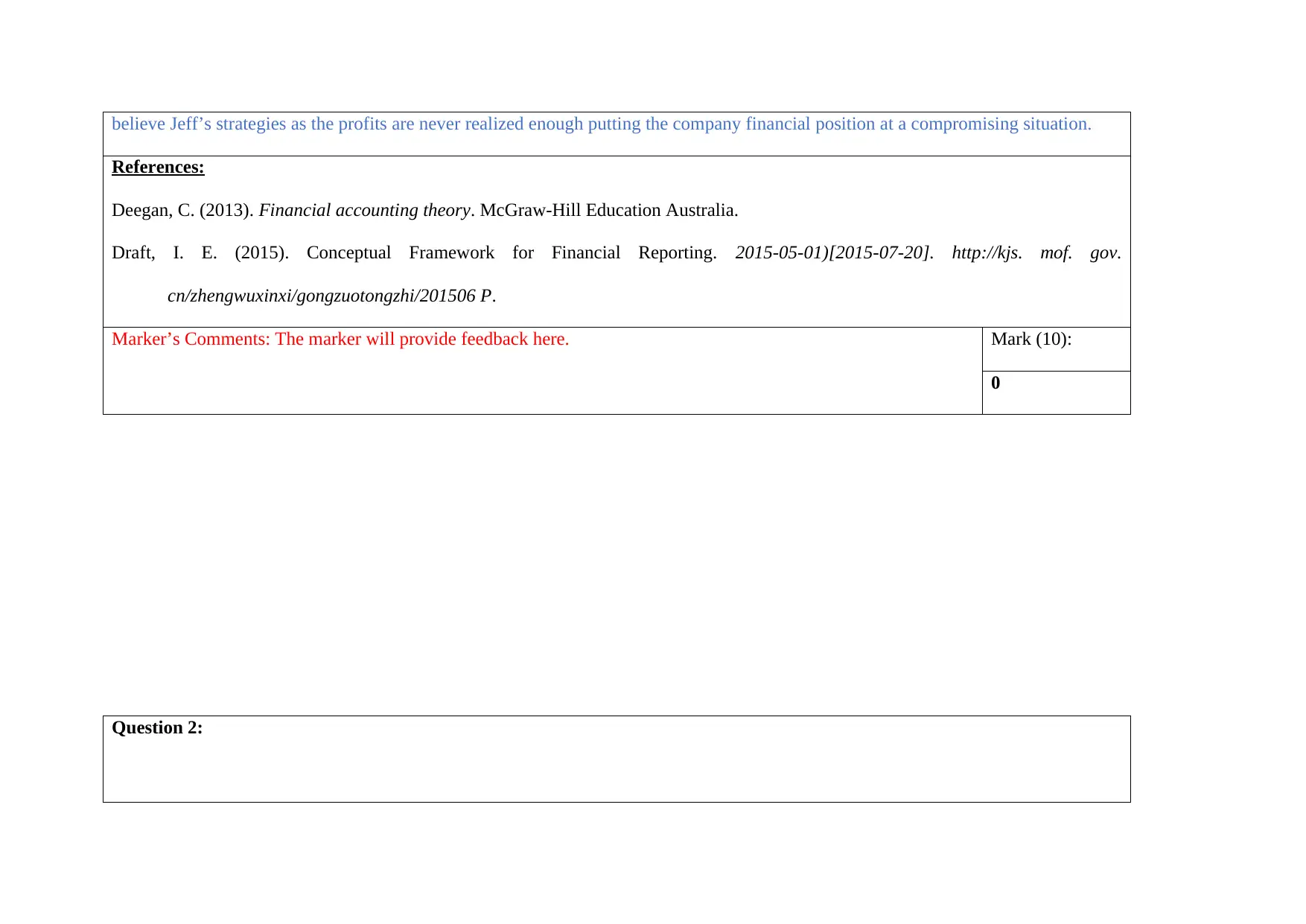
believe Jeff’s strategies as the profits are never realized enough putting the company financial position at a compromising situation.
References:
Deegan, C. (2013). Financial accounting theory. McGraw-Hill Education Australia.
Draft, I. E. (2015). Conceptual Framework for Financial Reporting. 2015-05-01)[2015-07-20]. http://kjs. mof. gov.
cn/zhengwuxinxi/gongzuotongzhi/201506 P.
Marker’s Comments: The marker will provide feedback here. Mark (10):
0
Question 2:
References:
Deegan, C. (2013). Financial accounting theory. McGraw-Hill Education Australia.
Draft, I. E. (2015). Conceptual Framework for Financial Reporting. 2015-05-01)[2015-07-20]. http://kjs. mof. gov.
cn/zhengwuxinxi/gongzuotongzhi/201506 P.
Marker’s Comments: The marker will provide feedback here. Mark (10):
0
Question 2:
Secure Best Marks with AI Grader
Need help grading? Try our AI Grader for instant feedback on your assignments.
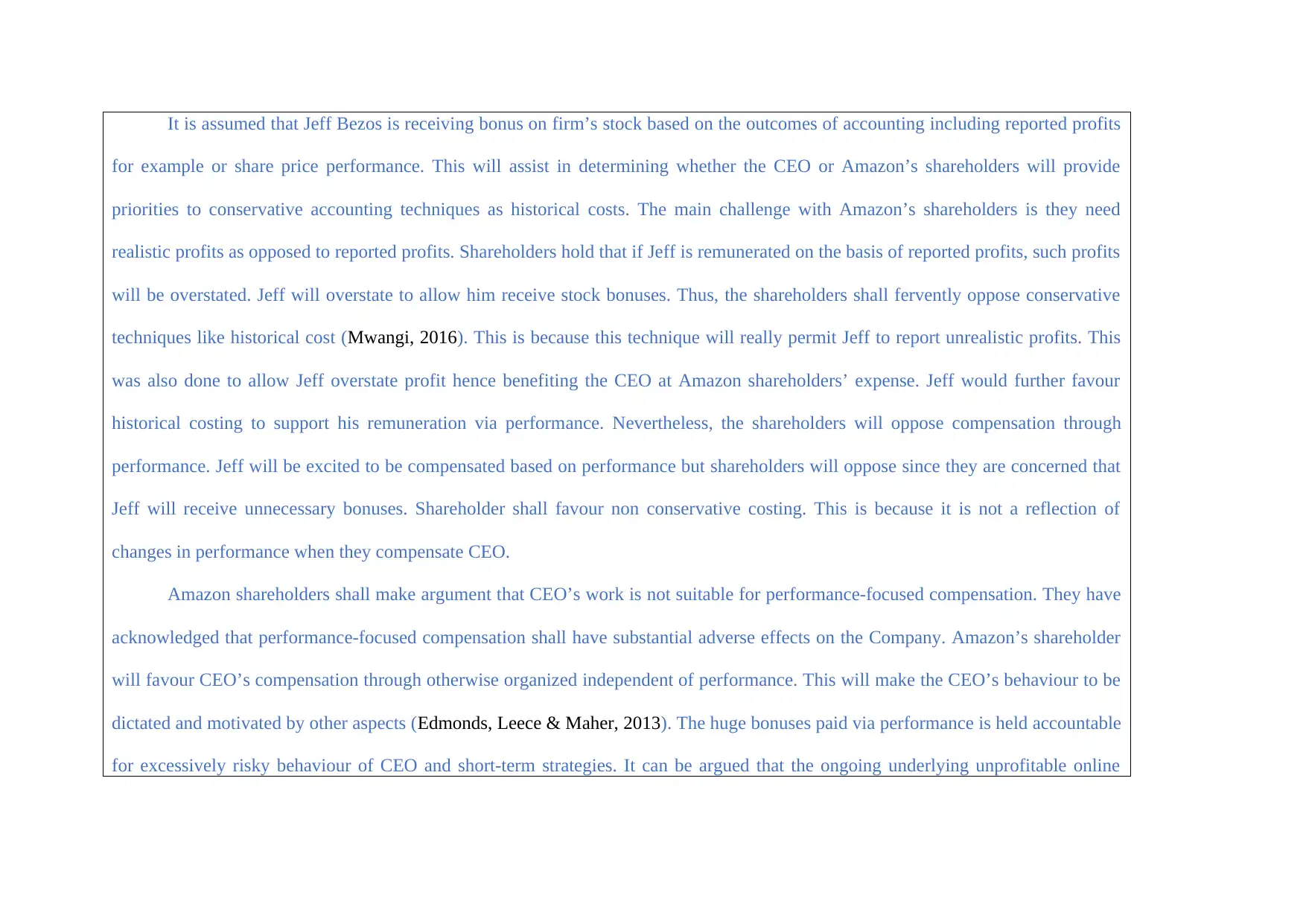
It is assumed that Jeff Bezos is receiving bonus on firm’s stock based on the outcomes of accounting including reported profits
for example or share price performance. This will assist in determining whether the CEO or Amazon’s shareholders will provide
priorities to conservative accounting techniques as historical costs. The main challenge with Amazon’s shareholders is they need
realistic profits as opposed to reported profits. Shareholders hold that if Jeff is remunerated on the basis of reported profits, such profits
will be overstated. Jeff will overstate to allow him receive stock bonuses. Thus, the shareholders shall fervently oppose conservative
techniques like historical cost (Mwangi, 2016). This is because this technique will really permit Jeff to report unrealistic profits. This
was also done to allow Jeff overstate profit hence benefiting the CEO at Amazon shareholders’ expense. Jeff would further favour
historical costing to support his remuneration via performance. Nevertheless, the shareholders will oppose compensation through
performance. Jeff will be excited to be compensated based on performance but shareholders will oppose since they are concerned that
Jeff will receive unnecessary bonuses. Shareholder shall favour non conservative costing. This is because it is not a reflection of
changes in performance when they compensate CEO.
Amazon shareholders shall make argument that CEO’s work is not suitable for performance-focused compensation. They have
acknowledged that performance-focused compensation shall have substantial adverse effects on the Company. Amazon’s shareholder
will favour CEO’s compensation through otherwise organized independent of performance. This will make the CEO’s behaviour to be
dictated and motivated by other aspects (Edmonds, Leece & Maher, 2013). The huge bonuses paid via performance is held accountable
for excessively risky behaviour of CEO and short-term strategies. It can be argued that the ongoing underlying unprofitable online
for example or share price performance. This will assist in determining whether the CEO or Amazon’s shareholders will provide
priorities to conservative accounting techniques as historical costs. The main challenge with Amazon’s shareholders is they need
realistic profits as opposed to reported profits. Shareholders hold that if Jeff is remunerated on the basis of reported profits, such profits
will be overstated. Jeff will overstate to allow him receive stock bonuses. Thus, the shareholders shall fervently oppose conservative
techniques like historical cost (Mwangi, 2016). This is because this technique will really permit Jeff to report unrealistic profits. This
was also done to allow Jeff overstate profit hence benefiting the CEO at Amazon shareholders’ expense. Jeff would further favour
historical costing to support his remuneration via performance. Nevertheless, the shareholders will oppose compensation through
performance. Jeff will be excited to be compensated based on performance but shareholders will oppose since they are concerned that
Jeff will receive unnecessary bonuses. Shareholder shall favour non conservative costing. This is because it is not a reflection of
changes in performance when they compensate CEO.
Amazon shareholders shall make argument that CEO’s work is not suitable for performance-focused compensation. They have
acknowledged that performance-focused compensation shall have substantial adverse effects on the Company. Amazon’s shareholder
will favour CEO’s compensation through otherwise organized independent of performance. This will make the CEO’s behaviour to be
dictated and motivated by other aspects (Edmonds, Leece & Maher, 2013). The huge bonuses paid via performance is held accountable
for excessively risky behaviour of CEO and short-term strategies. It can be argued that the ongoing underlying unprofitable online
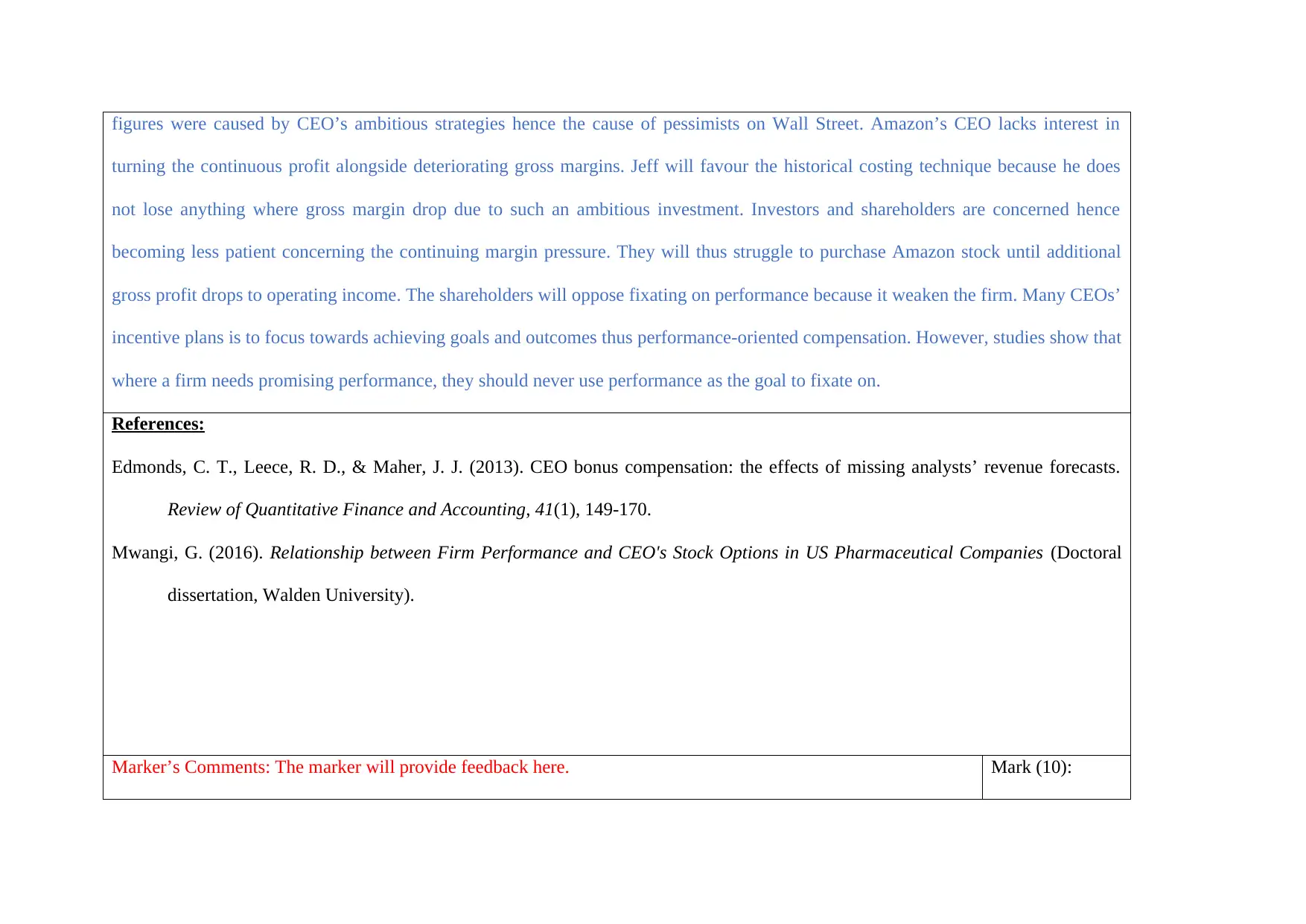
figures were caused by CEO’s ambitious strategies hence the cause of pessimists on Wall Street. Amazon’s CEO lacks interest in
turning the continuous profit alongside deteriorating gross margins. Jeff will favour the historical costing technique because he does
not lose anything where gross margin drop due to such an ambitious investment. Investors and shareholders are concerned hence
becoming less patient concerning the continuing margin pressure. They will thus struggle to purchase Amazon stock until additional
gross profit drops to operating income. The shareholders will oppose fixating on performance because it weaken the firm. Many CEOs’
incentive plans is to focus towards achieving goals and outcomes thus performance-oriented compensation. However, studies show that
where a firm needs promising performance, they should never use performance as the goal to fixate on.
References:
Edmonds, C. T., Leece, R. D., & Maher, J. J. (2013). CEO bonus compensation: the effects of missing analysts’ revenue forecasts.
Review of Quantitative Finance and Accounting, 41(1), 149-170.
Mwangi, G. (2016). Relationship between Firm Performance and CEO's Stock Options in US Pharmaceutical Companies (Doctoral
dissertation, Walden University).
Marker’s Comments: The marker will provide feedback here. Mark (10):
turning the continuous profit alongside deteriorating gross margins. Jeff will favour the historical costing technique because he does
not lose anything where gross margin drop due to such an ambitious investment. Investors and shareholders are concerned hence
becoming less patient concerning the continuing margin pressure. They will thus struggle to purchase Amazon stock until additional
gross profit drops to operating income. The shareholders will oppose fixating on performance because it weaken the firm. Many CEOs’
incentive plans is to focus towards achieving goals and outcomes thus performance-oriented compensation. However, studies show that
where a firm needs promising performance, they should never use performance as the goal to fixate on.
References:
Edmonds, C. T., Leece, R. D., & Maher, J. J. (2013). CEO bonus compensation: the effects of missing analysts’ revenue forecasts.
Review of Quantitative Finance and Accounting, 41(1), 149-170.
Mwangi, G. (2016). Relationship between Firm Performance and CEO's Stock Options in US Pharmaceutical Companies (Doctoral
dissertation, Walden University).
Marker’s Comments: The marker will provide feedback here. Mark (10):
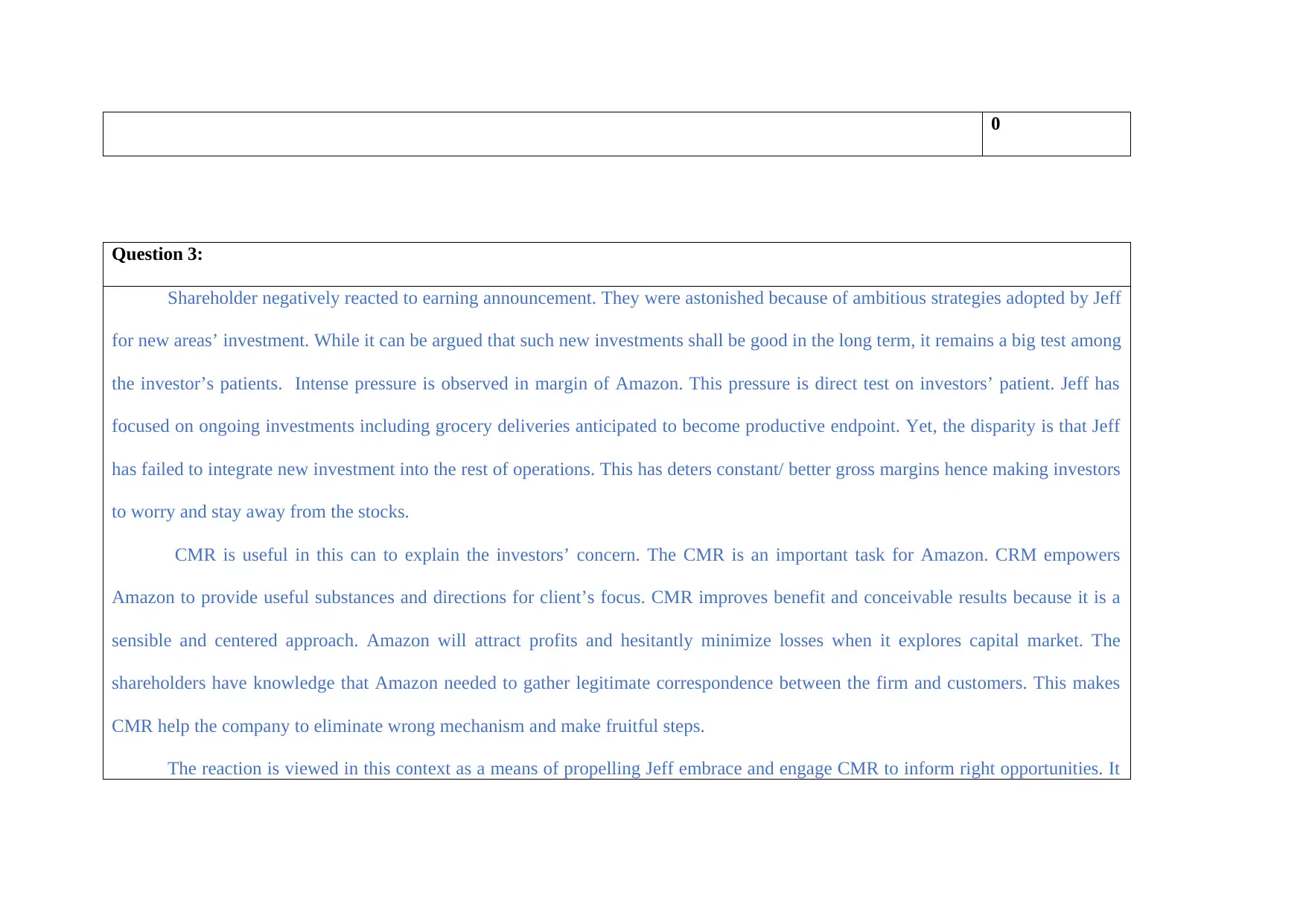
0
Question 3:
Shareholder negatively reacted to earning announcement. They were astonished because of ambitious strategies adopted by Jeff
for new areas’ investment. While it can be argued that such new investments shall be good in the long term, it remains a big test among
the investor’s patients. Intense pressure is observed in margin of Amazon. This pressure is direct test on investors’ patient. Jeff has
focused on ongoing investments including grocery deliveries anticipated to become productive endpoint. Yet, the disparity is that Jeff
has failed to integrate new investment into the rest of operations. This has deters constant/ better gross margins hence making investors
to worry and stay away from the stocks.
CMR is useful in this can to explain the investors’ concern. The CMR is an important task for Amazon. CRM empowers
Amazon to provide useful substances and directions for client’s focus. CMR improves benefit and conceivable results because it is a
sensible and centered approach. Amazon will attract profits and hesitantly minimize losses when it explores capital market. The
shareholders have knowledge that Amazon needed to gather legitimate correspondence between the firm and customers. This makes
CMR help the company to eliminate wrong mechanism and make fruitful steps.
The reaction is viewed in this context as a means of propelling Jeff embrace and engage CMR to inform right opportunities. It
Question 3:
Shareholder negatively reacted to earning announcement. They were astonished because of ambitious strategies adopted by Jeff
for new areas’ investment. While it can be argued that such new investments shall be good in the long term, it remains a big test among
the investor’s patients. Intense pressure is observed in margin of Amazon. This pressure is direct test on investors’ patient. Jeff has
focused on ongoing investments including grocery deliveries anticipated to become productive endpoint. Yet, the disparity is that Jeff
has failed to integrate new investment into the rest of operations. This has deters constant/ better gross margins hence making investors
to worry and stay away from the stocks.
CMR is useful in this can to explain the investors’ concern. The CMR is an important task for Amazon. CRM empowers
Amazon to provide useful substances and directions for client’s focus. CMR improves benefit and conceivable results because it is a
sensible and centered approach. Amazon will attract profits and hesitantly minimize losses when it explores capital market. The
shareholders have knowledge that Amazon needed to gather legitimate correspondence between the firm and customers. This makes
CMR help the company to eliminate wrong mechanism and make fruitful steps.
The reaction is viewed in this context as a means of propelling Jeff embrace and engage CMR to inform right opportunities. It
Paraphrase This Document
Need a fresh take? Get an instant paraphrase of this document with our AI Paraphraser
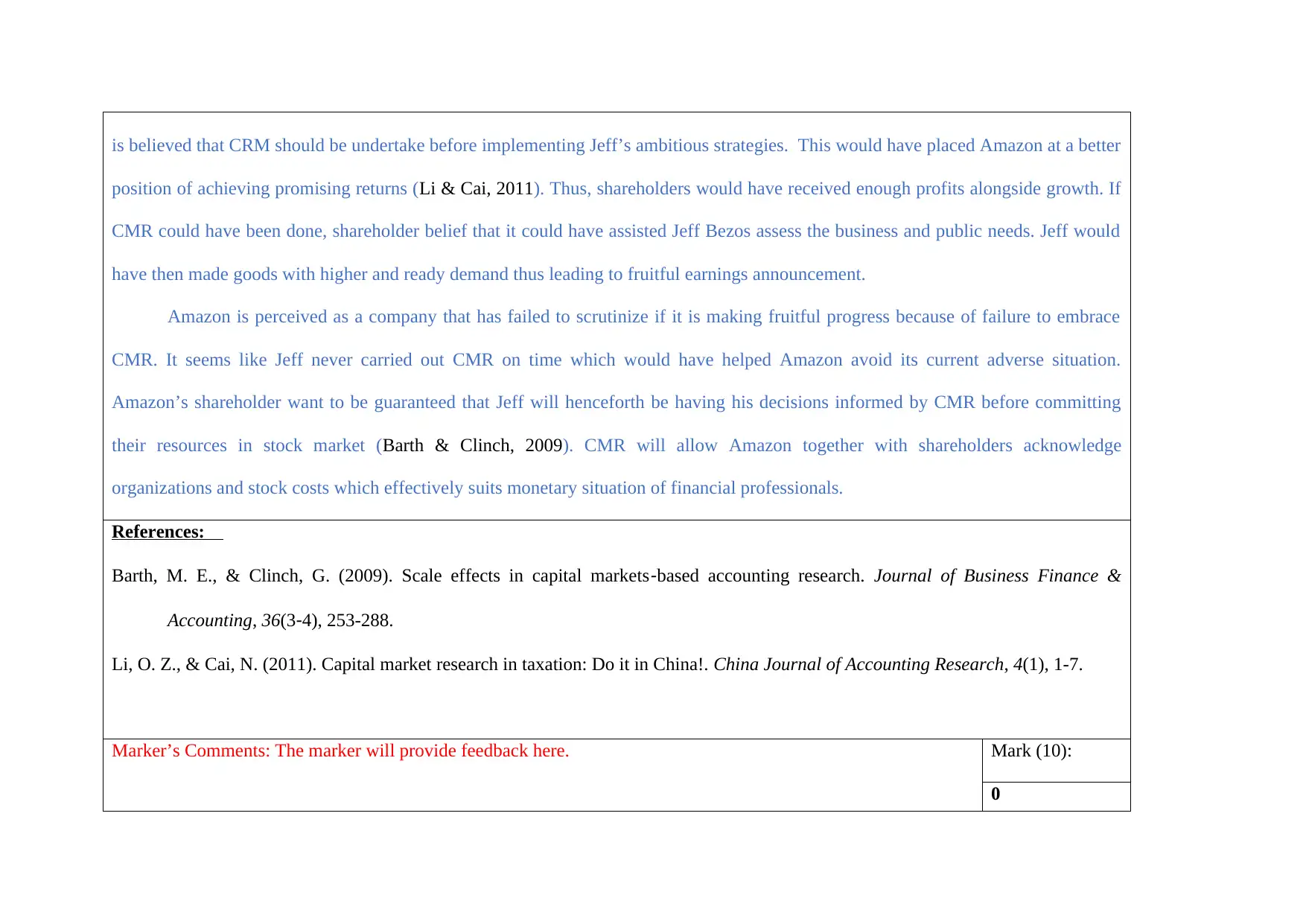
is believed that CRM should be undertake before implementing Jeff’s ambitious strategies. This would have placed Amazon at a better
position of achieving promising returns (Li & Cai, 2011). Thus, shareholders would have received enough profits alongside growth. If
CMR could have been done, shareholder belief that it could have assisted Jeff Bezos assess the business and public needs. Jeff would
have then made goods with higher and ready demand thus leading to fruitful earnings announcement.
Amazon is perceived as a company that has failed to scrutinize if it is making fruitful progress because of failure to embrace
CMR. It seems like Jeff never carried out CMR on time which would have helped Amazon avoid its current adverse situation.
Amazon’s shareholder want to be guaranteed that Jeff will henceforth be having his decisions informed by CMR before committing
their resources in stock market (Barth & Clinch, 2009). CMR will allow Amazon together with shareholders acknowledge
organizations and stock costs which effectively suits monetary situation of financial professionals.
References:
Barth, M. E., & Clinch, G. (2009). Scale effects in capital markets‐based accounting research. Journal of Business Finance &
Accounting, 36(3‐4), 253-288.
Li, O. Z., & Cai, N. (2011). Capital market research in taxation: Do it in China!. China Journal of Accounting Research, 4(1), 1-7.
Marker’s Comments: The marker will provide feedback here. Mark (10):
0
position of achieving promising returns (Li & Cai, 2011). Thus, shareholders would have received enough profits alongside growth. If
CMR could have been done, shareholder belief that it could have assisted Jeff Bezos assess the business and public needs. Jeff would
have then made goods with higher and ready demand thus leading to fruitful earnings announcement.
Amazon is perceived as a company that has failed to scrutinize if it is making fruitful progress because of failure to embrace
CMR. It seems like Jeff never carried out CMR on time which would have helped Amazon avoid its current adverse situation.
Amazon’s shareholder want to be guaranteed that Jeff will henceforth be having his decisions informed by CMR before committing
their resources in stock market (Barth & Clinch, 2009). CMR will allow Amazon together with shareholders acknowledge
organizations and stock costs which effectively suits monetary situation of financial professionals.
References:
Barth, M. E., & Clinch, G. (2009). Scale effects in capital markets‐based accounting research. Journal of Business Finance &
Accounting, 36(3‐4), 253-288.
Li, O. Z., & Cai, N. (2011). Capital market research in taxation: Do it in China!. China Journal of Accounting Research, 4(1), 1-7.
Marker’s Comments: The marker will provide feedback here. Mark (10):
0
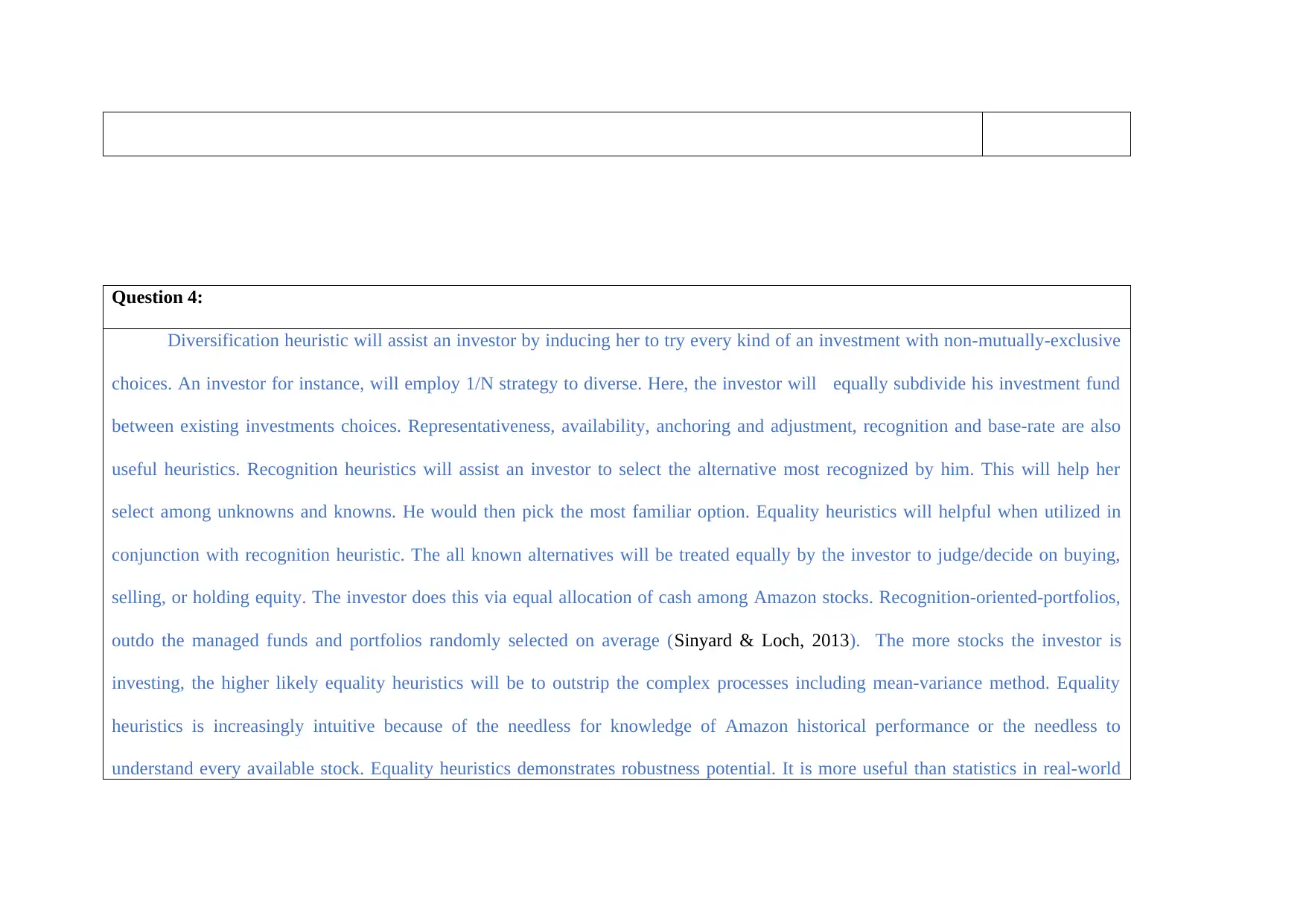
Question 4:
Diversification heuristic will assist an investor by inducing her to try every kind of an investment with non-mutually-exclusive
choices. An investor for instance, will employ 1/N strategy to diverse. Here, the investor will equally subdivide his investment fund
between existing investments choices. Representativeness, availability, anchoring and adjustment, recognition and base-rate are also
useful heuristics. Recognition heuristics will assist an investor to select the alternative most recognized by him. This will help her
select among unknowns and knowns. He would then pick the most familiar option. Equality heuristics will helpful when utilized in
conjunction with recognition heuristic. The all known alternatives will be treated equally by the investor to judge/decide on buying,
selling, or holding equity. The investor does this via equal allocation of cash among Amazon stocks. Recognition-oriented-portfolios,
outdo the managed funds and portfolios randomly selected on average (Sinyard & Loch, 2013). The more stocks the investor is
investing, the higher likely equality heuristics will be to outstrip the complex processes including mean-variance method. Equality
heuristics is increasingly intuitive because of the needless for knowledge of Amazon historical performance or the needless to
understand every available stock. Equality heuristics demonstrates robustness potential. It is more useful than statistics in real-world
Diversification heuristic will assist an investor by inducing her to try every kind of an investment with non-mutually-exclusive
choices. An investor for instance, will employ 1/N strategy to diverse. Here, the investor will equally subdivide his investment fund
between existing investments choices. Representativeness, availability, anchoring and adjustment, recognition and base-rate are also
useful heuristics. Recognition heuristics will assist an investor to select the alternative most recognized by him. This will help her
select among unknowns and knowns. He would then pick the most familiar option. Equality heuristics will helpful when utilized in
conjunction with recognition heuristic. The all known alternatives will be treated equally by the investor to judge/decide on buying,
selling, or holding equity. The investor does this via equal allocation of cash among Amazon stocks. Recognition-oriented-portfolios,
outdo the managed funds and portfolios randomly selected on average (Sinyard & Loch, 2013). The more stocks the investor is
investing, the higher likely equality heuristics will be to outstrip the complex processes including mean-variance method. Equality
heuristics is increasingly intuitive because of the needless for knowledge of Amazon historical performance or the needless to
understand every available stock. Equality heuristics demonstrates robustness potential. It is more useful than statistics in real-world
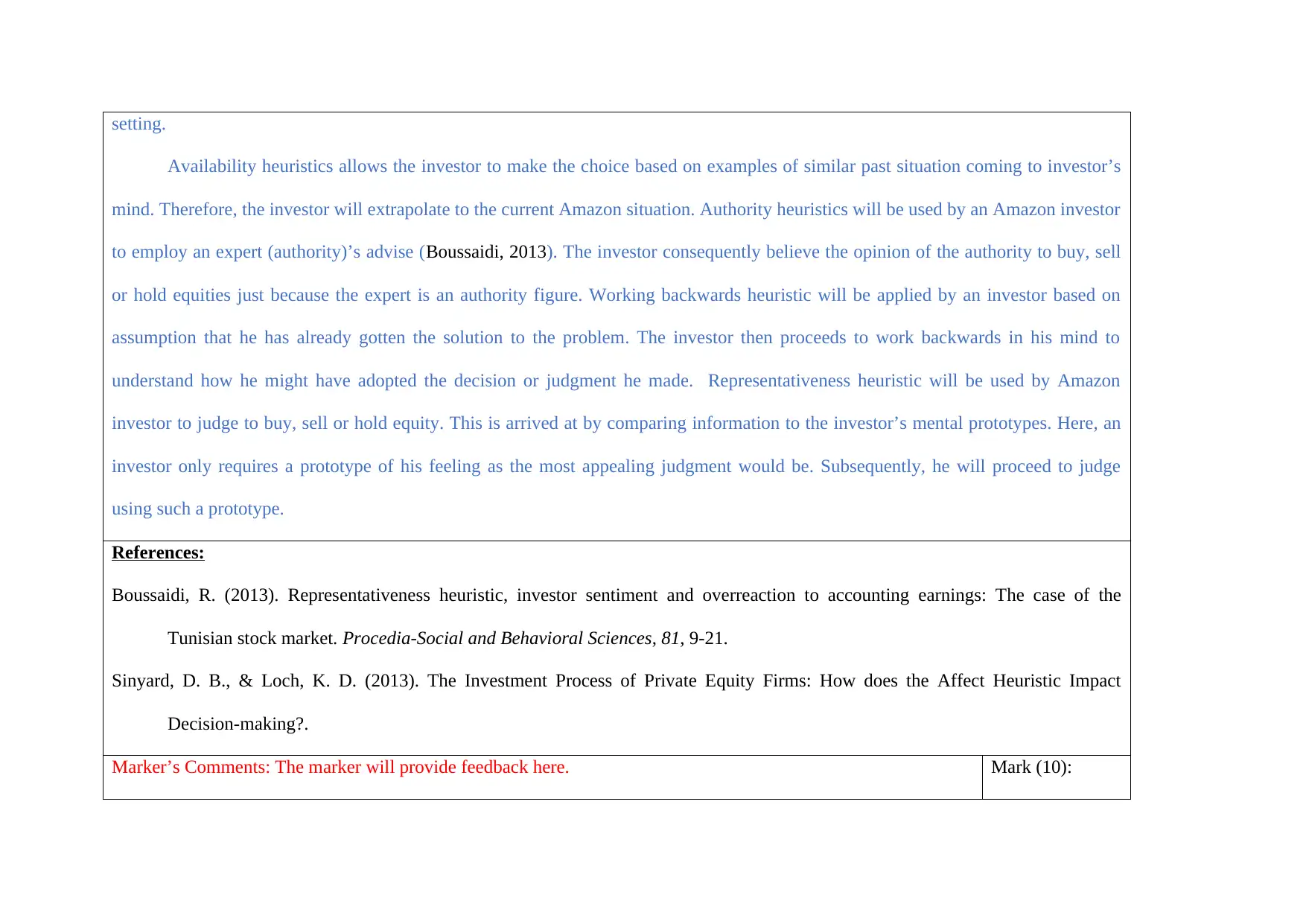
setting.
Availability heuristics allows the investor to make the choice based on examples of similar past situation coming to investor’s
mind. Therefore, the investor will extrapolate to the current Amazon situation. Authority heuristics will be used by an Amazon investor
to employ an expert (authority)’s advise (Boussaidi, 2013). The investor consequently believe the opinion of the authority to buy, sell
or hold equities just because the expert is an authority figure. Working backwards heuristic will be applied by an investor based on
assumption that he has already gotten the solution to the problem. The investor then proceeds to work backwards in his mind to
understand how he might have adopted the decision or judgment he made. Representativeness heuristic will be used by Amazon
investor to judge to buy, sell or hold equity. This is arrived at by comparing information to the investor’s mental prototypes. Here, an
investor only requires a prototype of his feeling as the most appealing judgment would be. Subsequently, he will proceed to judge
using such a prototype.
References:
Boussaidi, R. (2013). Representativeness heuristic, investor sentiment and overreaction to accounting earnings: The case of the
Tunisian stock market. Procedia-Social and Behavioral Sciences, 81, 9-21.
Sinyard, D. B., & Loch, K. D. (2013). The Investment Process of Private Equity Firms: How does the Affect Heuristic Impact
Decision-making?.
Marker’s Comments: The marker will provide feedback here. Mark (10):
Availability heuristics allows the investor to make the choice based on examples of similar past situation coming to investor’s
mind. Therefore, the investor will extrapolate to the current Amazon situation. Authority heuristics will be used by an Amazon investor
to employ an expert (authority)’s advise (Boussaidi, 2013). The investor consequently believe the opinion of the authority to buy, sell
or hold equities just because the expert is an authority figure. Working backwards heuristic will be applied by an investor based on
assumption that he has already gotten the solution to the problem. The investor then proceeds to work backwards in his mind to
understand how he might have adopted the decision or judgment he made. Representativeness heuristic will be used by Amazon
investor to judge to buy, sell or hold equity. This is arrived at by comparing information to the investor’s mental prototypes. Here, an
investor only requires a prototype of his feeling as the most appealing judgment would be. Subsequently, he will proceed to judge
using such a prototype.
References:
Boussaidi, R. (2013). Representativeness heuristic, investor sentiment and overreaction to accounting earnings: The case of the
Tunisian stock market. Procedia-Social and Behavioral Sciences, 81, 9-21.
Sinyard, D. B., & Loch, K. D. (2013). The Investment Process of Private Equity Firms: How does the Affect Heuristic Impact
Decision-making?.
Marker’s Comments: The marker will provide feedback here. Mark (10):
Secure Best Marks with AI Grader
Need help grading? Try our AI Grader for instant feedback on your assignments.
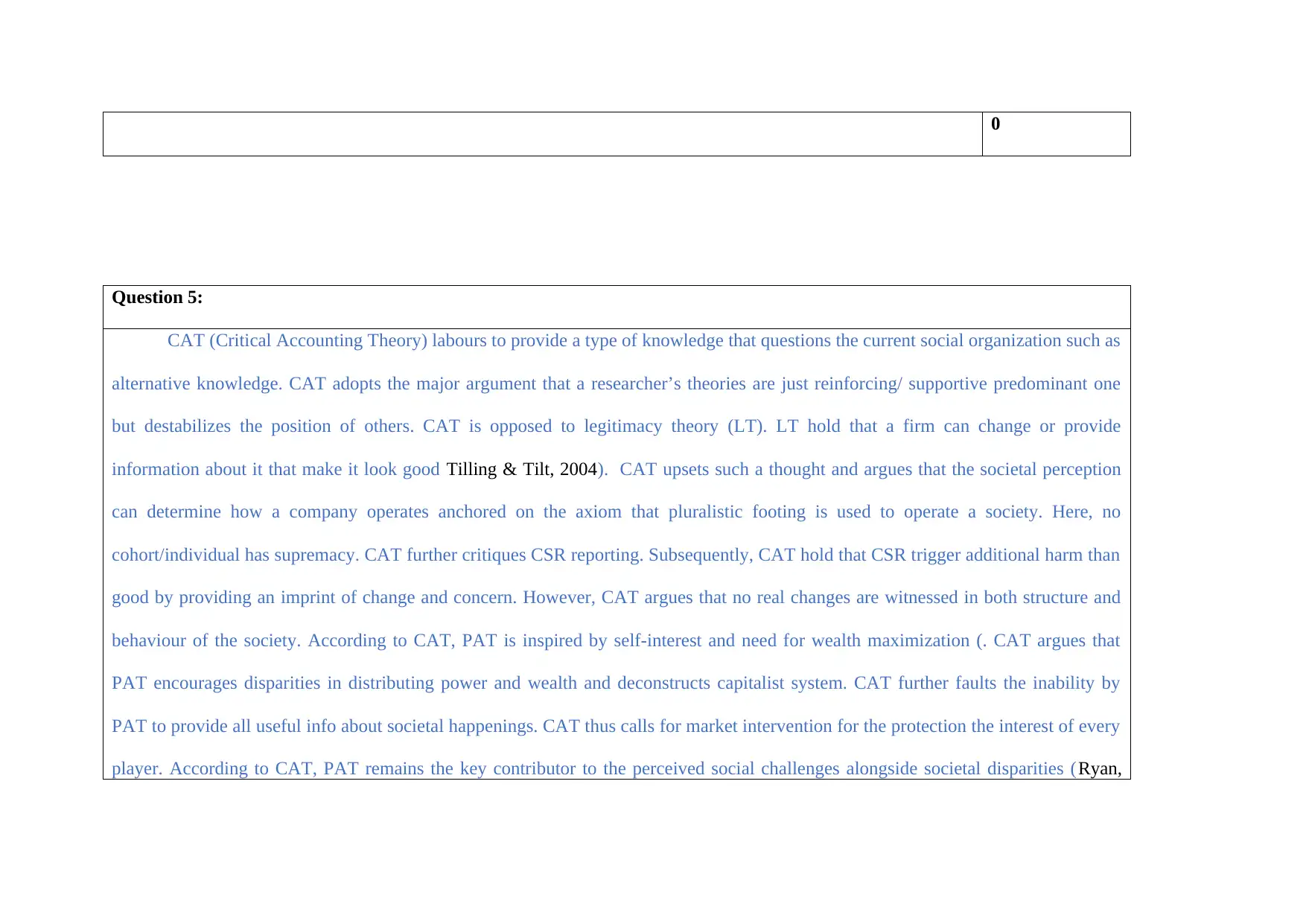
0
Question 5:
CAT (Critical Accounting Theory) labours to provide a type of knowledge that questions the current social organization such as
alternative knowledge. CAT adopts the major argument that a researcher’s theories are just reinforcing/ supportive predominant one
but destabilizes the position of others. CAT is opposed to legitimacy theory (LT). LT hold that a firm can change or provide
information about it that make it look good Tilling & Tilt, 2004). CAT upsets such a thought and argues that the societal perception
can determine how a company operates anchored on the axiom that pluralistic footing is used to operate a society. Here, no
cohort/individual has supremacy. CAT further critiques CSR reporting. Subsequently, CAT hold that CSR trigger additional harm than
good by providing an imprint of change and concern. However, CAT argues that no real changes are witnessed in both structure and
behaviour of the society. According to CAT, PAT is inspired by self-interest and need for wealth maximization (. CAT argues that
PAT encourages disparities in distributing power and wealth and deconstructs capitalist system. CAT further faults the inability by
PAT to provide all useful info about societal happenings. CAT thus calls for market intervention for the protection the interest of every
player. According to CAT, PAT remains the key contributor to the perceived social challenges alongside societal disparities (Ryan,
Question 5:
CAT (Critical Accounting Theory) labours to provide a type of knowledge that questions the current social organization such as
alternative knowledge. CAT adopts the major argument that a researcher’s theories are just reinforcing/ supportive predominant one
but destabilizes the position of others. CAT is opposed to legitimacy theory (LT). LT hold that a firm can change or provide
information about it that make it look good Tilling & Tilt, 2004). CAT upsets such a thought and argues that the societal perception
can determine how a company operates anchored on the axiom that pluralistic footing is used to operate a society. Here, no
cohort/individual has supremacy. CAT further critiques CSR reporting. Subsequently, CAT hold that CSR trigger additional harm than
good by providing an imprint of change and concern. However, CAT argues that no real changes are witnessed in both structure and
behaviour of the society. According to CAT, PAT is inspired by self-interest and need for wealth maximization (. CAT argues that
PAT encourages disparities in distributing power and wealth and deconstructs capitalist system. CAT further faults the inability by
PAT to provide all useful info about societal happenings. CAT thus calls for market intervention for the protection the interest of every
player. According to CAT, PAT remains the key contributor to the perceived social challenges alongside societal disparities (Ryan,
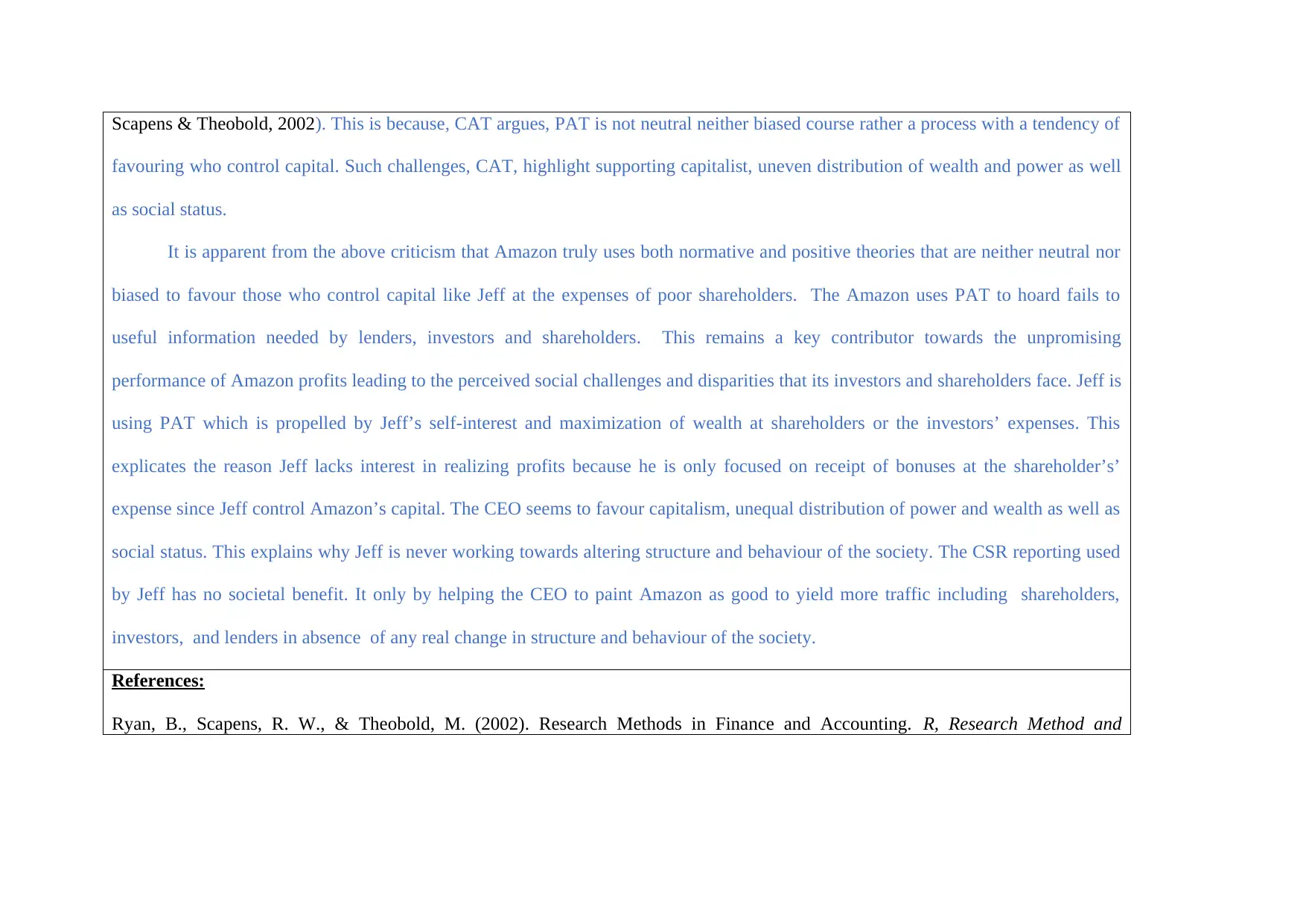
Scapens & Theobold, 2002). This is because, CAT argues, PAT is not neutral neither biased course rather a process with a tendency of
favouring who control capital. Such challenges, CAT, highlight supporting capitalist, uneven distribution of wealth and power as well
as social status.
It is apparent from the above criticism that Amazon truly uses both normative and positive theories that are neither neutral nor
biased to favour those who control capital like Jeff at the expenses of poor shareholders. The Amazon uses PAT to hoard fails to
useful information needed by lenders, investors and shareholders. This remains a key contributor towards the unpromising
performance of Amazon profits leading to the perceived social challenges and disparities that its investors and shareholders face. Jeff is
using PAT which is propelled by Jeff’s self-interest and maximization of wealth at shareholders or the investors’ expenses. This
explicates the reason Jeff lacks interest in realizing profits because he is only focused on receipt of bonuses at the shareholder’s’
expense since Jeff control Amazon’s capital. The CEO seems to favour capitalism, unequal distribution of power and wealth as well as
social status. This explains why Jeff is never working towards altering structure and behaviour of the society. The CSR reporting used
by Jeff has no societal benefit. It only by helping the CEO to paint Amazon as good to yield more traffic including shareholders,
investors, and lenders in absence of any real change in structure and behaviour of the society.
References:
Ryan, B., Scapens, R. W., & Theobold, M. (2002). Research Methods in Finance and Accounting. R, Research Method and
favouring who control capital. Such challenges, CAT, highlight supporting capitalist, uneven distribution of wealth and power as well
as social status.
It is apparent from the above criticism that Amazon truly uses both normative and positive theories that are neither neutral nor
biased to favour those who control capital like Jeff at the expenses of poor shareholders. The Amazon uses PAT to hoard fails to
useful information needed by lenders, investors and shareholders. This remains a key contributor towards the unpromising
performance of Amazon profits leading to the perceived social challenges and disparities that its investors and shareholders face. Jeff is
using PAT which is propelled by Jeff’s self-interest and maximization of wealth at shareholders or the investors’ expenses. This
explicates the reason Jeff lacks interest in realizing profits because he is only focused on receipt of bonuses at the shareholder’s’
expense since Jeff control Amazon’s capital. The CEO seems to favour capitalism, unequal distribution of power and wealth as well as
social status. This explains why Jeff is never working towards altering structure and behaviour of the society. The CSR reporting used
by Jeff has no societal benefit. It only by helping the CEO to paint Amazon as good to yield more traffic including shareholders,
investors, and lenders in absence of any real change in structure and behaviour of the society.
References:
Ryan, B., Scapens, R. W., & Theobold, M. (2002). Research Methods in Finance and Accounting. R, Research Method and
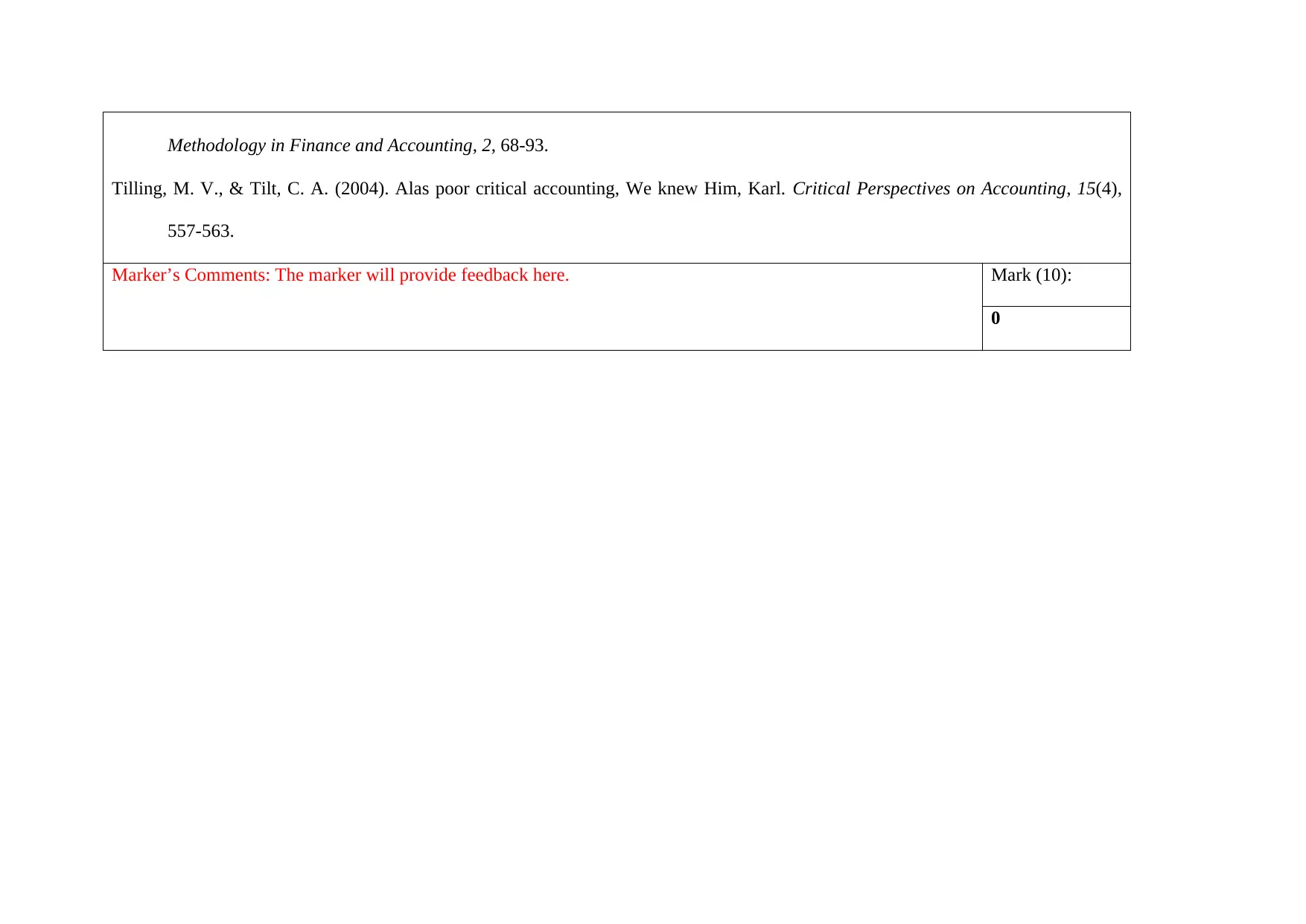
Methodology in Finance and Accounting, 2, 68-93.
Tilling, M. V., & Tilt, C. A. (2004). Alas poor critical accounting, We knew Him, Karl. Critical Perspectives on Accounting, 15(4),
557-563.
Marker’s Comments: The marker will provide feedback here. Mark (10):
0
Tilling, M. V., & Tilt, C. A. (2004). Alas poor critical accounting, We knew Him, Karl. Critical Perspectives on Accounting, 15(4),
557-563.
Marker’s Comments: The marker will provide feedback here. Mark (10):
0
1 out of 13
Related Documents
Your All-in-One AI-Powered Toolkit for Academic Success.
+13062052269
info@desklib.com
Available 24*7 on WhatsApp / Email
![[object Object]](/_next/static/media/star-bottom.7253800d.svg)
Unlock your academic potential
© 2024 | Zucol Services PVT LTD | All rights reserved.




